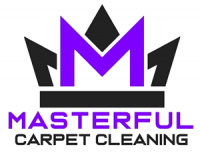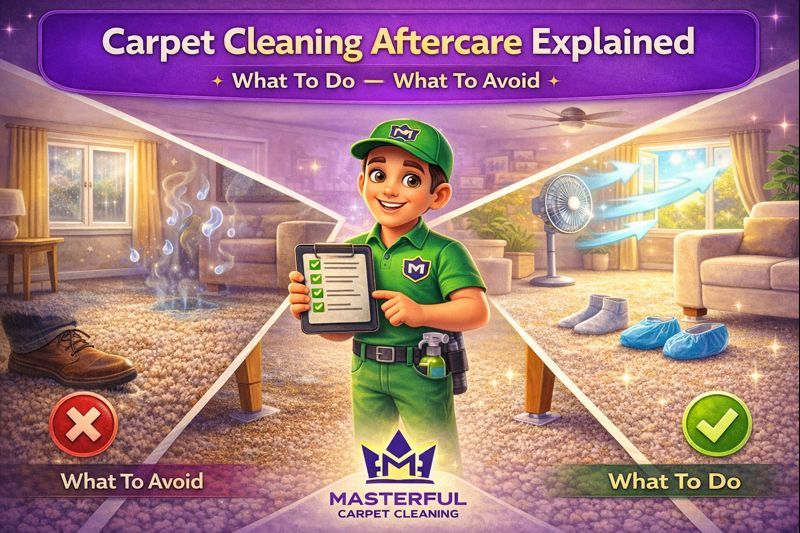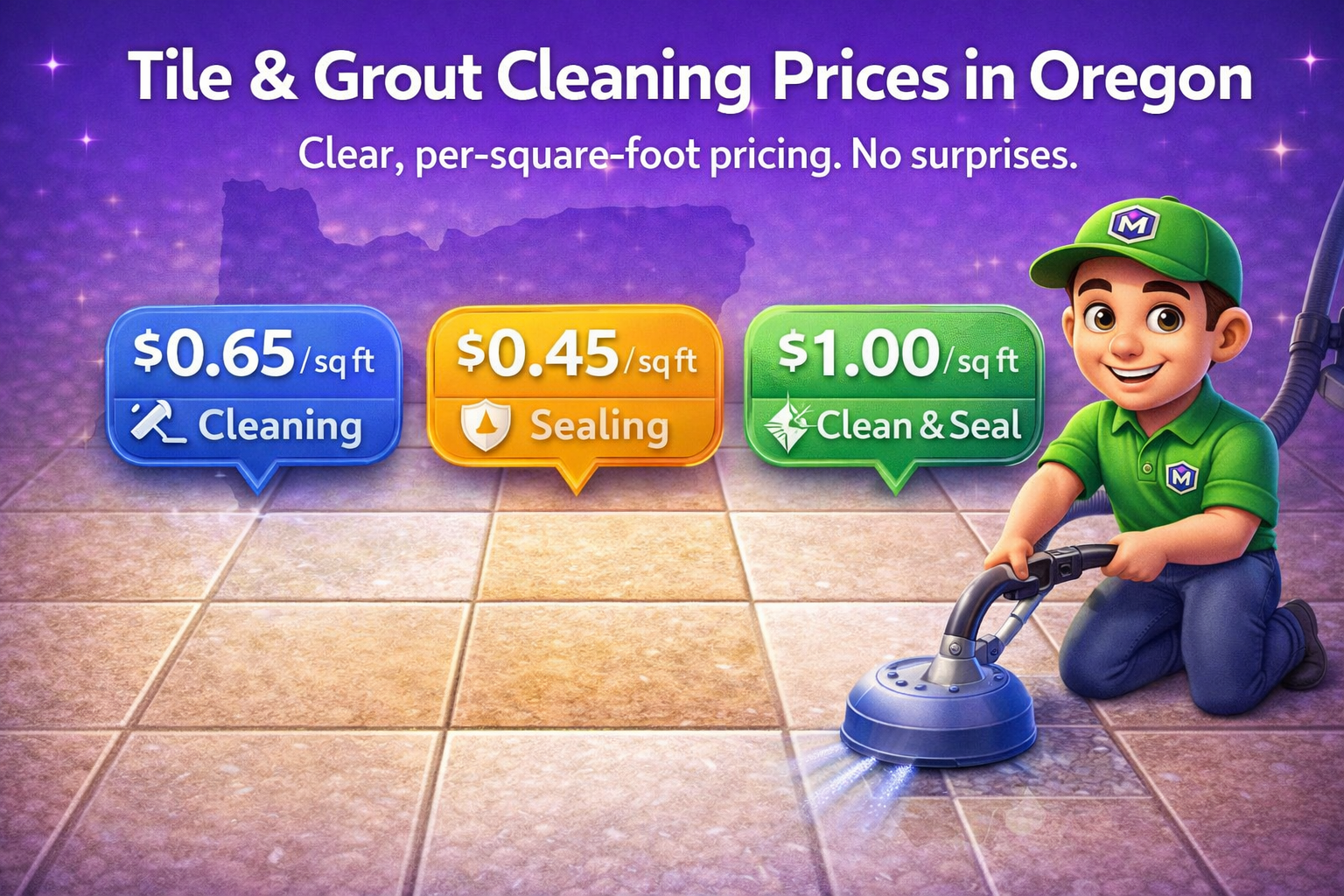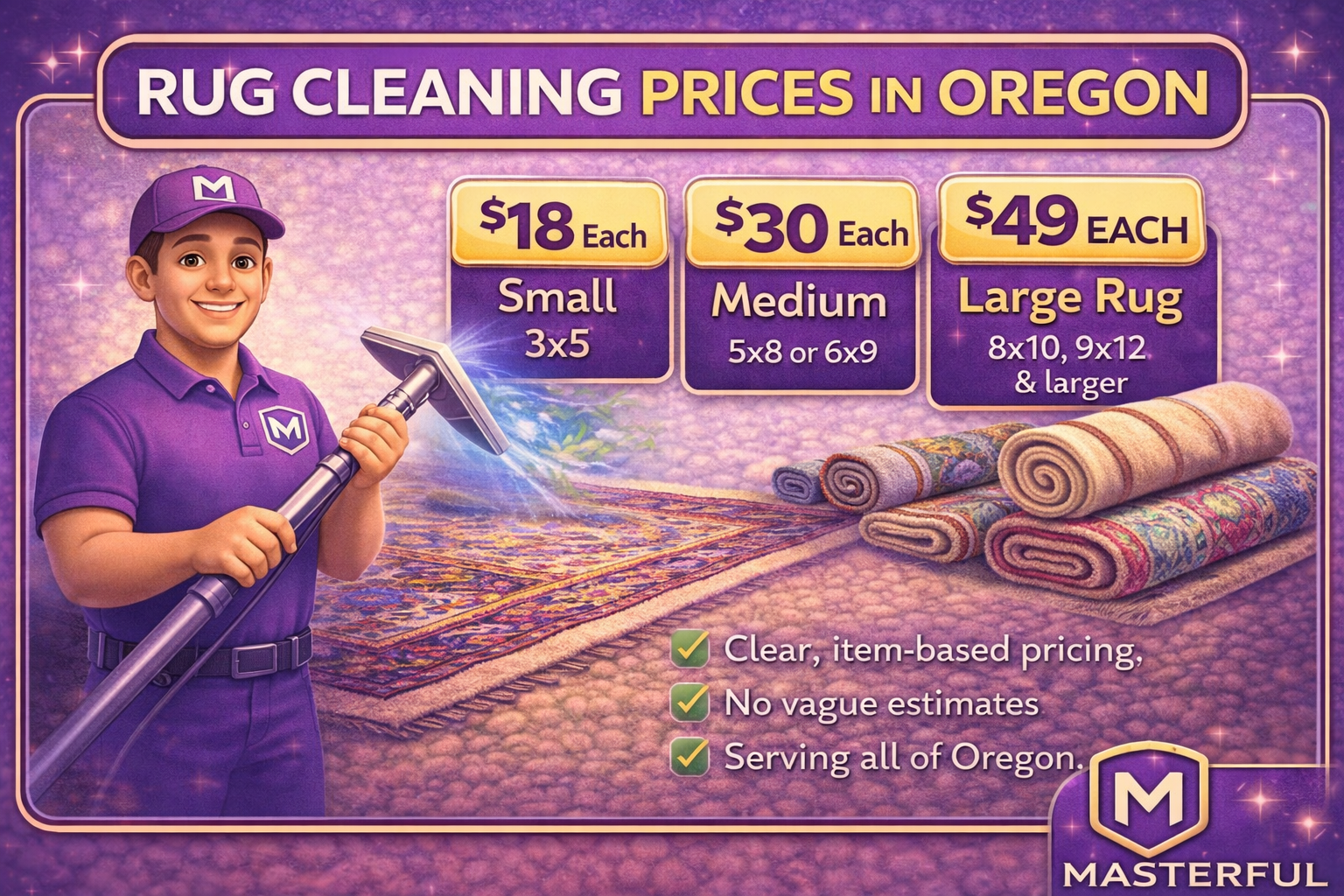Eco-Friendly Cleanup Options for Common Spills

While adopting eco-friendly practices for handling spills is important, sometimes professional intervention is necessary to achieve a thorough cleaning.
Trust Masterful Carpet Cleaning to provide expert and environmentally responsible cleaning services.
Why Choose Masterful Carpet Cleaning?
- Expertise in Eco-Friendly Cleaning:
- Green Cleaning Solutions: Our team uses non-toxic, biodegradable cleaning products that are safe for your family and the environment.
- Advanced Techniques: We employ the latest eco-friendly cleaning techniques to effectively remove stains and spills without harming the planet.
- Comprehensive and Sustainable Service:
- Deep Cleaning: Our services penetrate deep into carpets and upholstery to remove even the toughest stains, ensuring a thorough and lasting clean.
- Odor Elimination: We use natural deodorizing methods to leave your home smelling fresh without the use of harsh chemicals.
- Professional and Reliable:
- Certified Technicians: Our team is trained and certified in eco-friendly cleaning practices, ensuring the highest standards of service.
- Satisfaction Guaranteed: We are committed to providing excellent customer service and guarantee your satisfaction with our eco-friendly cleaning solutions.
Book Your Eco-Friendly Cleaning Service Today
Don’t let spills compromise the cleanliness and sustainability of your home. Contact Masterful Carpet Cleaning for expert and environmentally responsible spill response services.
- Schedule an Appointment: Use our convenient online booking system to arrange for a professional cleaning at a time that suits you.
- Contact Us: Have questions or need assistance? Our friendly customer service team is ready to help. Call us or reach out through our website for prompt and professional support.
Ensure your home remains clean and green with Masterful Carpet Cleaning.
Schedule your eco-friendly cleaning service today and experience the difference!
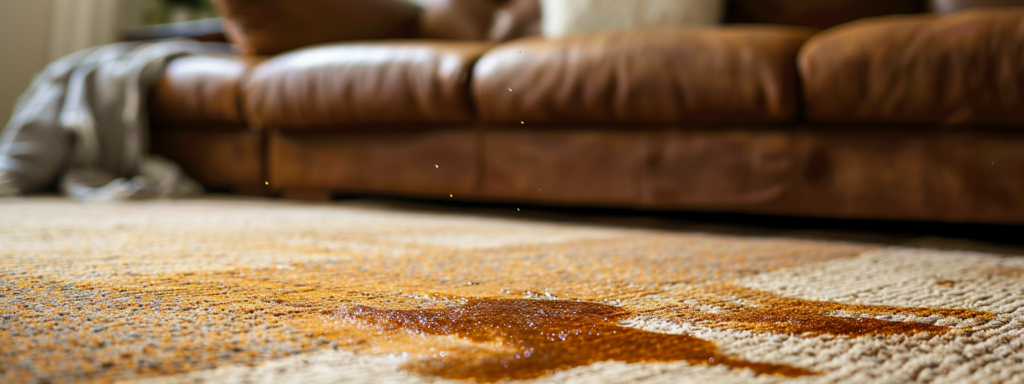
Natural Cleaning Solutions
Using natural cleaning solutions for spills is a great way to protect the environment and ensure safe, effective cleanup. Here are some recipes and recommendations for homemade, non-toxic, biodegradable cleaners:
All-Purpose Cleaner
- Ingredients:
- White Vinegar: 1 cup
- Water: 1 cup
- Essential Oil (optional): 10-15 drops (e.g., lemon, lavender, tea tree)
- Preparation:
- Mix equal parts white vinegar and water in a spray bottle.
- Add a few drops of essential oil for fragrance and additional antibacterial properties.
- Usage:
- Spray the solution directly on spills and wipe clean with a cloth.
- Suitable for countertops, tiles, and other hard surfaces.
Baking Soda and Vinegar Paste
- Ingredients:
- Baking Soda: 1/2 cup
- White Vinegar: Enough to form a paste
- Preparation:
- Mix baking soda with a small amount of white vinegar to create a paste.
- Usage:
- Apply the paste to stubborn stains or spills on surfaces like sinks, stovetops, and grout.
- Let it sit for 15-20 minutes, then scrub with a brush and rinse clean.
Citrus Enzyme Cleaner
- Ingredients:
- Citrus Peels (orange, lemon, lime): 2 cups
- Brown Sugar: 1/2 cup
- Water: 4 cups
- Preparation:
- Place citrus peels and brown sugar in a large jar.
- Add water, leaving some space at the top of the jar, and close the lid.
- Shake the jar to mix the ingredients and let it ferment for 2-3 weeks, shaking it occasionally.
- Usage:
- Strain the liquid into a spray bottle.
- Use as an all-purpose cleaner for kitchen surfaces, bathrooms, and floors.
Castile Soap Solution
- Ingredients:
- Liquid Castile Soap: 2 tablespoons
- Water: 2 cups
- Essential Oil (optional): 10 drops (e.g., peppermint, eucalyptus)
- Preparation:
- Mix Castile soap and water in a spray bottle.
- Add essential oil if desired for fragrance.
- Usage:
- Spray on spills and wipe clean with a cloth.
- Ideal for cleaning glass, mirrors, and general surfaces.
Hydrogen Peroxide and Baking Soda
- Ingredients:
- Hydrogen Peroxide: 1/4 cup
- Baking Soda: 1/4 cup
- Preparation:
- Mix hydrogen peroxide and baking soda to form a paste.
- Usage:
- Apply the paste to stains on carpets, upholstery, and fabrics.
- Let it sit for 30 minutes, then scrub gently and rinse with water.
Pro Tips:
- Label Your Solutions: Clearly label all homemade cleaning solutions and keep them out of reach of children and pets.
- Test First: Always test a small, inconspicuous area before applying any cleaner to a larger surface to ensure it does not cause damage or discoloration.
- Use Reusable Cloths: Opt for reusable microfiber cloths or sponges instead of disposable paper towels to reduce waste.
By using these natural cleaning solutions, you can effectively manage common spills while minimizing environmental impact and promoting a healthier home environment.
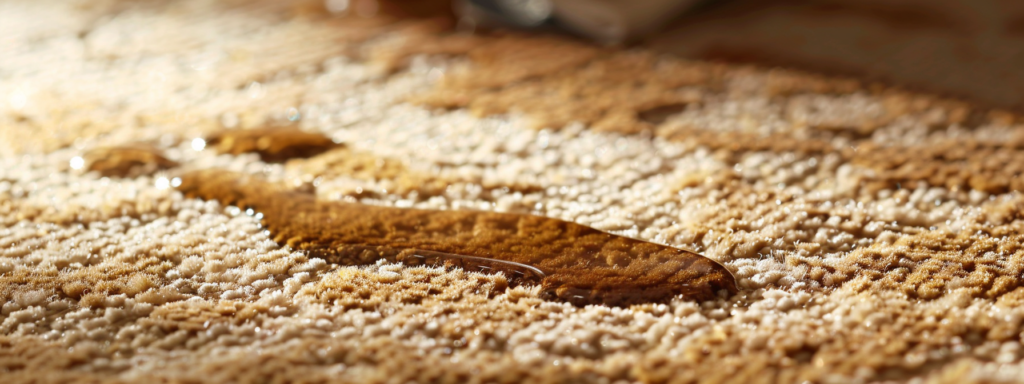
Eco-Friendly Commercial Products
For those who prefer ready-made solutions, numerous eco-friendly commercial cleaning products are both effective and safe for the environment. Here’s an overview of sustainable commercial cleaners for various types of spills:
General Purpose Cleaners
- Seventh Generation All-Purpose Cleaner:
- Ingredients: Plant-based formula with essential oils and botanical extracts.
- Usage: Spray on surfaces like countertops, appliances, and floors, then wipe clean with a cloth.
- Benefits: Non-toxic, biodegradable, and safe for use around children and pets.
- Method All-Purpose Cleaner:
- Ingredients: Naturally derived ingredients with a pleasant fragrance.
- Usage: Spray directly on spills and stains, then wipe away with a cloth or sponge.
- Benefits: Cruelty-free, biodegradable, and available in refillable bottles to reduce waste.
Carpet and Upholstery Cleaners
- Biokleen Bac-Out Stain+Odor Remover:
- Ingredients: Enzyme-based formula with lime peel extract and plant-based surfactants.
- Usage: Spray on carpet or upholstery stains, let sit for a few minutes, then blot with a clean cloth.
- Benefits: Effective on organic stains, eco-friendly, and free from artificial fragrances and colors.
- Eco-Me Carpet Cleaner:
- Ingredients: Plant extracts and natural enzymes.
- Usage: Spray on the stained area, let it sit for a few minutes, then blot with a clean cloth.
- Benefits: Non-toxic, biodegradable, and safe for all types of carpets and fabrics.
Glass and Mirror Cleaners
- Seventh Generation Glass & Surface Cleaner:
- Ingredients: Plant-based formula with essential oils.
- Usage: Spray on glass or mirrors and wipe clean with a lint-free cloth or paper towel.
- Benefits: Streak-free formula, non-toxic, and environmentally friendly packaging.
- Method Glass Cleaner:
- Ingredients: Naturally derived ingredients with a fresh mint scent.
- Usage: Spray on glass surfaces and mirrors, then wipe with a microfiber cloth for a streak-free shine.
- Benefits: Biodegradable, non-toxic, and cruelty-free.
Degreasers
- Simple Green All-Purpose Cleaner:
- Ingredients: Concentrated, biodegradable formula made from non-toxic ingredients.
- Usage: Dilute with water as directed and apply to greasy spills on countertops, stovetops, and other surfaces.
- Benefits: Versatile cleaner that’s safe for the environment and effective on tough grease.
- ECOS Orange Plus Cleaner and Degreaser:
- Ingredients: Plant-based surfactants with orange oil.
- Usage: Spray directly on greasy areas, let sit for a few minutes, then wipe clean.
- Benefits: Non-toxic, biodegradable, and leaves a fresh citrus scent.
Bathroom Cleaners
- Mrs. Meyer’s Clean Day Bathroom Cleaner:
- Ingredients: Plant-derived ingredients and essential oils.
- Usage: Spray on bathroom surfaces, such as sinks, tiles, and tubs, then scrub and rinse clean.
- Benefits: Biodegradable, non-toxic, and available in various refreshing scents.
- Ecover Bathroom Cleaner:
- Ingredients: Plant-based formula with biodegradable ingredients.
- Usage: Spray on surfaces, let sit for a few minutes, then wipe or scrub and rinse clean.
- Benefits: Effective against soap scum and lime scale, environmentally friendly, and safe for septic systems.
Pro Tips:
- Read Labels: Look for certifications such as USDA Organic, Green Seal, or EcoLogo to ensure the product meets high environmental standards.
- Refill and Reuse: Choose products available in bulk or refillable containers to reduce plastic waste.
- Store Properly: Keep eco-friendly cleaners in a cool, dry place away from direct sunlight to maintain their effectiveness.
By opting for eco-friendly commercial cleaning products, you can effectively handle common spills while supporting sustainable practices and reducing your environmental footprint.
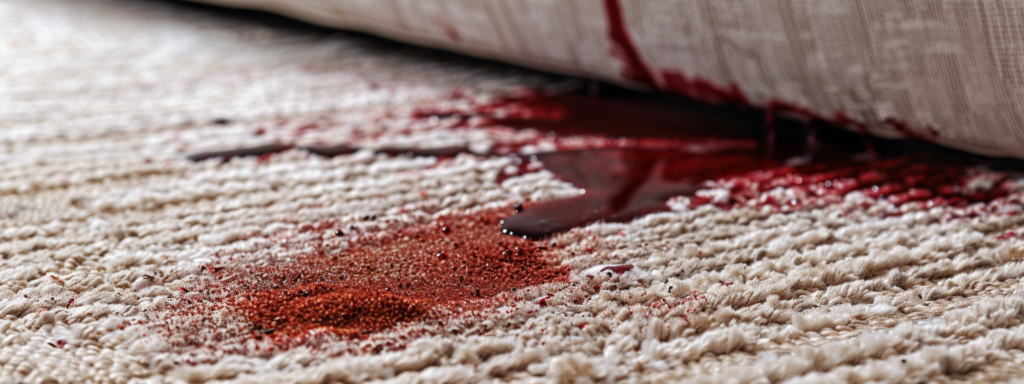
Sustainable Practices
Adopting sustainable practices during spill cleanups not only helps protect the environment but also promotes long-term health and safety in your home. Here are some tips for reducing waste and enhancing sustainability during cleanup:
Reducing Waste
- Reusable Cleaning Tools:
- Microfiber Cloths: Use washable microfiber cloths instead of disposable paper towels. They are highly absorbent, durable, and can be reused multiple times.
- Sponges and Brushes: Opt for reusable sponges and brushes made from sustainable materials. Clean and sanitize them regularly to extend their lifespan.
- Recycled and Biodegradable Products:
- Biodegradable Wipes: Choose biodegradable cleaning wipes that break down naturally, reducing landfill waste.
- Recycled Paper Towels: If you must use disposable paper towels, select brands that offer recycled content options.
Efficient Use of Resources
- Conserving Water:
- Spot Cleaning: Address spills promptly with minimal water use by spot cleaning rather than washing large areas.
- Rinse Basins: Use rinse basins for cleaning cloths and tools to conserve water instead of running taps continuously.
- Diluting Concentrated Cleaners:
- Proper Dilution: Follow manufacturer instructions to dilute concentrated cleaners properly. This not only ensures effective cleaning but also extends the product’s usage, reducing the need for frequent purchases.
Eco-Friendly Disposal
- Safe Disposal of Cleaning Solutions:
- Non-Toxic Disposal: Dispose of non-toxic cleaning solutions down the drain with plenty of water. Avoid pouring hazardous chemicals into the sink to prevent water pollution.
- Hazardous Waste Collection: Use local hazardous waste collection services for disposing of chemicals, paints, and other hazardous materials. Check your local municipality’s guidelines for proper disposal.
- Composting Organic Absorbents:
- Natural Absorbents: Use natural absorbents like sawdust, cornstarch, or baking soda to clean up spills. If these absorbents are used on non-toxic spills, they can be composted rather than thrown away.
Energy-Efficient Practices
- Air Drying:
- Air Drying Tools: After cleaning, air dry cloths, sponges, and brushes instead of using a dryer. This saves energy and extends the life of your cleaning tools.
- Ventilation: Improve natural ventilation by opening windows and using fans to dry cleaned areas, reducing the need for energy-intensive drying methods.
- Efficient Use of Appliances:
- Energy-Saving Appliances: If you use appliances like steam cleaners or vacuum cleaners, choose energy-efficient models to reduce your environmental impact.
- Scheduled Cleaning: Plan and schedule regular cleanings to avoid the need for intensive, last-minute cleanups that may use more energy and resources.
Educating and Involving Household Members
- Promoting Sustainable Habits:
- Educate Family Members: Teach everyone in your household about the importance of sustainable cleaning practices and how to implement them.
- Assign Responsibilities: Assign specific cleanup responsibilities to different family members to ensure that sustainable practices are followed consistently.
- Sustainable Cleanup Kits:
- Eco-Friendly Kits: Assemble cleanup kits with eco-friendly cleaning products, reusable tools, and clear instructions. Place these kits in accessible areas around the house for quick and sustainable spill response.
Pro Tips:
- Stay Informed: Keep up-to-date with the latest sustainable cleaning practices and products. Join eco-friendly cleaning forums or follow green living blogs for tips and recommendations.
- Buy in Bulk: Purchase eco-friendly cleaning products in bulk to reduce packaging waste and save on transportation energy.
- DIY Solutions: Consider making your own cleaning solutions using simple, natural ingredients like vinegar, baking soda, and essential oils.
By incorporating these sustainable practices into your cleanup routine, you can effectively manage spills while minimizing your environmental impact and fostering a healthier, more eco-conscious household.
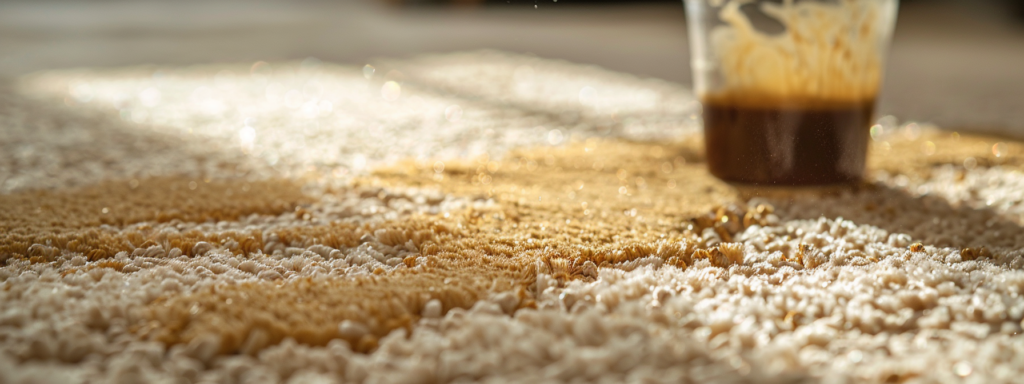
Emergency Response Strategies
Being prepared with eco-friendly methods for handling spills can significantly reduce environmental impact without compromising effectiveness. Here’s how to prepare for and handle spills sustainably:
Preparation and Readiness
- Eco-Friendly Spill Kits:
- Contents: Assemble a spill kit containing biodegradable absorbents (e.g., sawdust, cornstarch), reusable cloths, natural cleaning solutions, and eco-friendly gloves.
- Storage: Keep the kit in an easily accessible location, such as the kitchen, garage, or under the sink, to ensure a quick response to spills.
- Regular Training:
- Household Training: Educate all household members on how to use the spill kit and the importance of eco-friendly cleaning practices.
- Emergency Drills: Conduct regular drills to practice spill response, ensuring everyone knows what to do in an emergency.
Immediate Spill Response
- Containment:
- Absorb Quickly: Use biodegradable absorbents to contain and soak up spills immediately. This prevents the spill from spreading and reduces the risk of staining or environmental contamination.
- Barriers: Place reusable cloths or towels around the spill to create a barrier and prevent it from spreading to unaffected areas.
- Cleanup with Natural Solutions:
- All-Purpose Cleaner: Spray a natural all-purpose cleaner (e.g., vinegar and water solution) on the spill and wipe clean with a reusable cloth.
- Baking Soda Paste: For stubborn stains, apply a paste of baking soda and water, let it sit for 15 minutes, then scrub gently with a brush and rinse with water.
Handling Specific Types of Spills
- Oil and Grease Spills:
- Absorbent Materials: Use natural absorbents like cornstarch or baking soda to soak up oil and grease. Sprinkle the absorbent on the spill, let it sit for several minutes, then sweep or vacuum it up.
- Cleaning Solution: Follow with an eco-friendly degreaser or a mixture of dish soap and warm water. Scrub the area with a reusable brush and rinse with water.
- Food and Beverage Spills:
- Immediate Blotting: Blot spills immediately with a reusable cloth to absorb as much liquid as possible.
- Natural Enzyme Cleaner: Apply a natural enzyme cleaner or a vinegar and water solution to break down organic stains. Let it sit for a few minutes, then blot and rinse with water.
- Chemical Spills:
- Safety First: Ensure proper ventilation and wear eco-friendly gloves. Use natural absorbents to contain the spill.
- Neutralization: If applicable, neutralize the chemical with a safe, eco-friendly neutralizing agent. Follow up with a thorough cleaning using a natural cleaning solution.
Post-Cleanup Practices
- Proper Disposal:
- Non-Hazardous Waste: Compost or dispose of natural absorbents used on non-toxic spills in accordance with local regulations.
- Hazardous Waste: For chemical spills, follow local guidelines for hazardous waste disposal to ensure safe and environmentally responsible handling.
- Ventilation:
- Air Out: After cleaning, open windows and use fans to improve air circulation and speed up drying. This reduces indoor air pollutants and helps prevent mold growth.
- Regular Maintenance:
- Routine Checks: Perform regular checks of areas prone to spills, such as kitchens and garages, to address potential issues before they become major problems.
- Preventive Measures: Use coasters, placemats, and trays to catch spills before they reach surfaces, making cleanup easier and more eco-friendly.
Pro Tips:
- Stay Stocked: Regularly check and restock your spill kit to ensure you always have the necessary supplies on hand.
- Eco-Friendly Substitutes: Replace traditional cleaning products with eco-friendly alternatives as they run out to gradually transition to a greener household.
- Evaluate and Improve: After each spill response, evaluate the effectiveness of your methods and make improvements to your strategy as needed.
By preparing for and handling spills with eco-friendly methods, you can manage emergencies effectively while minimizing your environmental impact and promoting sustainability in your home.
Author
-

As the Co-Owner of Masterful, Randy has been providing quality cleaning services to the Salem and Portland areas of Oregon for many years. He has built a reputation for excellence in the industry. His team take prides in using the latest cleaning techniques and technologies to deliver exceptional results every time.
View all posts
